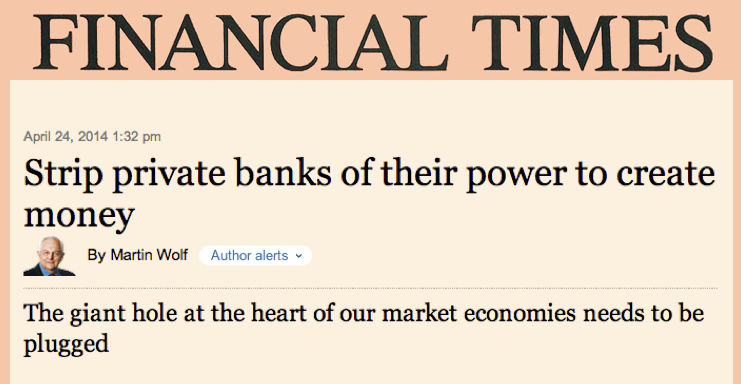“Strip private banks of their power to create money”: Financial Times’ Martin Wolf endorses Positive Money’s proposals for reform


[first]Positive Money’s proposals have just been advocated by Martin Wolf, the chief economics commentator at the Financial Times, in an article entitled “Strip private banks of their power to create money“:[/first]
“Printing counterfeit banknotes is illegal, but creating private money is not. The interdependence between the state and the businesses that can do this is the source of much of the instability of our economies. It could – and should – be terminated.”
Wolf highlights the fact that the ability of banks to create money requires governments and taxpayers to underwrite the banking system:
“Banking is therefore not a normal market activity, because it provides two linked public goods: money and the payments network. On one side of banks’ balance sheets lie risky assets; on the other lie liabilities the public thinks safe. This is why central banks act as lenders of last resort and governments provide deposit insurance and equity injections. It is also why banking is heavily regulated. Yet credit cycles are still hugely destabilising.”
“What is to be done? A minimum response would leave this industry largely as it is but both tighten regulation and insist that a bigger proportion of the balance sheet be financed with equity or credibly loss-absorbing debt. … A maximum response would be to give the state a monopoly on money creation.“
The article then refers to Modernising Money, the book that we published in early 2013, and gives an overview of our proposals (summarised below):
The state, not banks, would create all money. Customers would own the money in transaction accounts (which would never be put at risk), and would pay the banks a fee for providing payments services.
Banks would also offer investment accounts, which fund loans. But banks could only lend money that was actively invested by customers. They would no longer be allowed to create new money out of thin air.
The central bank would create new money as is necessary to promote non-inflationary growth.
Decisions on how much money would be taken by a committee independent of government (much like the Monetary Policy Committee).
Finally, new money would be injected into the economy via a) government spending, b) tax cuts, c) to make direct payments to citizens, d) to pay down existing debts – national or public, or e) to make new loans through banks or other lending firms (such as peer to peer business lenders).
Wolf highlights some of the benefits of this reform:
“The transition to a system in which money creation is separated from financial intermediation would be feasible, albeit complex. But it would bring huge advantages. It would be possible to increase the money supply without encouraging people to borrow to the hilt. It would end “too big to fail” in banking. It would also transfer seignorage – the benefits from creating money – to the public. In 2013, for example, sterling M1 (transactions money) was 80 per cent of gross domestic product. If the central bank decided this could grow at 5 per cent a year, the government could run a fiscal deficit of 4 per cent of GDP without borrowing or taxing. The right might decide to cut taxes, the left to raise spending. The choice would be political, as it should be.”
He points out only 10% of UK bank lending actually goes to businesses, meaning that restricting the level of bank lending doesn’t have to mean that businesses will suffer. (Speculative credit to property bubbles and financial markets could be restricted whilst preserving credit to businesses).
Wolf summarises by saying that:
“Our financial system is so unstable because the state first allowed it to create almost all the money in the economy and was then forced to insure it when performing that function. This is a giant hole at the heart of our market economies. It could be closed by separating the provision of money, rightly a function of the state, from the provision of finance, a function of the private sector.”
Wolf concludes that the although this change won’t come about immediately, we should remember the possibility of making these changes, because “When the next crisis comes – and it surely will – we need to be ready.”
Naturally, we’ll be working to try to bring about this change before the current system causes another crisis.